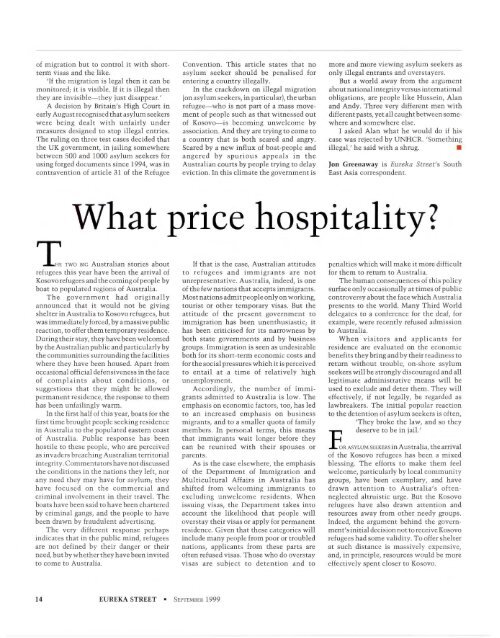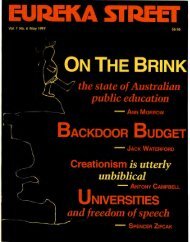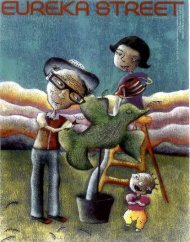1 - Eureka Street
1 - Eureka Street
1 - Eureka Street
- No tags were found...
Create successful ePaper yourself
Turn your PDF publications into a flip-book with our unique Google optimized e-Paper software.
of migration but to control it with shorttermvisas and the like.'If the migration is legal then it can bemonitored; it is visible. If it is illegal thenthey are invisible-they just disappear.'A decision by Britain's High Court inearly August recognised that asylum seekerswere being dealt with unfairly underm easures designed to stop illegal entries.The ruling on three test cases decided thatthe UK governmen t, in jailing somewherebetween 500 and 1000 asylum seekers forusing forged docum ents since 1994, was incontravention of article 31 of the RefugeeConvention. T his article states that noasylum seeker should be penalised forentering a country illegally.In the crackdown on illegal migration(on asylum seekers, in particular), the urbanrefugee-who is not part of a mass movementof people such as that witnessed outof Kosovo-is becoming unwelcome byassociation. And they are trying to com e toa country that is both scared and angry.Scared by a new influx of boat-people andan gered by spurious appeal s in theAustralian courts by people trying to delayeviction. In this clima te the government ismore and more viewing asylum seekers asonly illegal entrants and overstayers.But a world away from the argumentabout na tiona! integrity versus in terna tiona!obligations, are people like Hussein, Alanand Andy. Three very different m en withdifferent pasts, yet all caught between somewhere and somewhere else.I asked Alan what he would do if hiscase was rejected by UNHCR. 'Som ethingillegal,' he said with a shrug.•Jon Greenaway is <strong>Eureka</strong> <strong>Street</strong>'s SouthEast Asia correspondent.What price hospitality?L TWO me Au"'"li'n ""d" 'boutrefugees this year have been the arrival ofKosovo refugees and the coming of people byboat to populated regions of Australia.T h e governm ent had originallyannounced that it would not be givingsh elter in Australia to Kosovo refugees, butwas immediately forced, by a massive publicreaction, to offer them temporary residence.During their stay, they have been welcomedby the Australian public and particularly bythe communities surrounding the facilitieswhere they have been housed. Apart fromoccasional official defensiven ess in the faceof complaints abo ut conditions, orsuggestions that they might be allowedpermanent residence, the response to themhas been unfailingly warm.In the first half of this year, boa ts for thefirst time brought people seeking residencein Australia to the populated eastern coastof Australia. Public response has beenhostile to these people, who are perceivedas invaders breaching Australian territorialintegrity. Com menta tors have not discussedthe conditions in the nations they left, norany need they may have for asyl um; theyhave focused o n the commercial andcriminal involvement in their travel. Theboats have been said to have been charteredby criminal gangs, and the people to havebeen drawn by fra udulent advertising.T he very different response perhapsindicates that in the public mind, refugeesare not defined by their danger or theirneed, but by whether they have been invitedto come to Australia.If that is the case, Australian attitudesto refugees and im.migrants are notunrepresentative. Australia, indeed, is oneof the few nations that accepts immigrants.Most nations admit people only on working,tourist or other temporary visas. But theattitude of the present government toimmigration has been unenthusiastic; ithas been criticised for its narrowness byboth state governments and by businessgroups. Immigration is seen as undesirableboth for its short-term economic costs andfor the social pressures which it is perceivedto entail at a time of relatively highunemployment.Accordingly, the number of immigrantsadmitted to Australia is low. Theemphasis on economic factors, too, has ledto an increased emphasis on businessmigrants, and to a smaller quota of familymembers. In personal terms, this m eansthat immigrants wait longer before theycan be reunited with their spouses orparents.As is the case elsewhere, the emphasisof the Department of Immigration andMulticultural Affairs in Australia hasshifted from welcoming immigrants toexcluding unwelcome residents. Whenissuing visas, the Department takes intoaccount the likelihood that people willoverstay their visas or apply for permanentresidence. Given that these categories willinclude many people from poor or troublednations, applicants from these parts areoften refused visas. Those who do overstayvisas are s ubj ect t o detention and topenalties which will make it m ore difficultfor them to return to Australia.The human consequences of this policysurface only occasionally at times of publiccontroversy about the face w hich Australiapresents to the world. Many Third Worlddelegates to a conference for the deaf, forexample, were recently refused admissionto Australia.When v isitors and applicants forresidence are evaluated on the economicbenefits they bring and by their readiness toreturn without trouble, on-shore asylumseekers will be strongly discouraged and alllegitimate administrative m eans will beused to exclude and deter them. They willeffectively, if not legally, be regarded aslawbreakers. The initial popular reactionto the detention of asylum seekers is often,'They broke the law, and so theydeserve to be in jail. 'EOR ASYLUM SEEKERS in Australia, the arrivalof the Kosovo refugees has been a mixedblessing. The efforts to make them feelwelcome, particularly by local communitygroups, have been exemplary, and havedrawn attention t o Australia's oftenneglectedaltruistic urge. But the Kosovorefugees have also drawn attention andresources away from oth er needy groups.Indeed, the argument behind the government'sinitial decision not to receive Kosovorefugees had some validity. To offer shelterat such distance is massively expensive,and, in principle, resources would be moreeffectively spent closer to Kosovo.14 EUREKA STREET • SEPTEMBER 1999
















